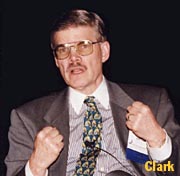
Ambitions crash to earth as Clark quits in Seattle
Originally published in Current,
April 21, 2003
By Karen Everhart
As the Seattle Times prepared to reveal mounting debts and mismanagement at KCTS last week, the station laid off 11 production staff and announced that President Burnhill Clark will retire in October.
 Clark
felt he had become the target in local press accounts of KCTS's financial
troubles. Board Chairman Douglas Beighle, a retired Boeing executive,
said the station's leader for 16 years "thought it was in the best
interest of the station that he retire."
Clark
felt he had become the target in local press accounts of KCTS's financial
troubles. Board Chairman Douglas Beighle, a retired Boeing executive,
said the station's leader for 16 years "thought it was in the best
interest of the station that he retire."
The staff cuts last week were only the first half of a reorganization that Clark will oversee as the station cuts its losses in national productions. David Rabinovitch, v.p. of production, left his job after his contract expired in March. KCTS may eliminate as many as 35 positions by December, though execs still expect to end the fiscal year with a deficit.
"Employees, former executives and the station's own paid consultants say Clark runs the public entity like a private fiefdom," reported Cheryl Phillips and Kay McFadden in the Times April 18. "They say Clark, whose total compensation is $268,000 a year, does not tolerate opposing opinions and dominates a weak board of directors."
In an interview with Current, Clark said he decided to retire after realizing that the station must be refocused on local service--and that he wouldn't have time at the station to see through that strategic redirection. "That epiphany said to me I really need to step aside . . . for a new leader to commit the time and energy to achieve our focus on this local effort."
Clark's propensity for ambitious strategies helped put the Seattle station in a dire cash crunch, according to former executives and producers. His efforts to build KCTS into a West Coast production hub succeeded with Bill Nye the Science Guy and scenic high-definition travelogues, but critics say it foundered in recent years as underwriting withered, budgets fell short on the revenue side and management failed to react promptly. KCTS's pioneering investment in HDTV hasn't paid off because slow rollout of the technology limited demand for the station's production expertise.
"Ten years ago in its heyday it was a well-respected station, Burnie was well-respected within the system, and we had Bill Nye," said one former employee who, like many producers and managers once affiliated with the station, requested anonymity. "It attracted so many good people, and it's sad to see what has happened."
When the KCTS Board moved to cut years of financial losses last year, the station was operating with a cash deficit of $1.2 million, according to its Dec. 31 consolidated financial statement posted on the Times website. Its cash assets dropped 13 percent in the first quarter of fiscal 2003. The station claimed $7.1 million in deferred revenue, had borrowed nearly $1 million from a bequest, and owed the city $228,502 in back rent.
An accountant who reviewed the statement described it as a "very bleak picture."
Since 2001, the station has been paying off a $2.8 million program dues debt to PBS.
CPB is withholding $750,000 of KCTS's community service grant until the station delivers its fiscal 2002 audited financial statements. The document was due at CPB in November; KCTS got an extension until April 30. The station board meets this week to approve the statement that reports a $1.25 million deficit for fiscal 2002, according to Clark. CPB's Inspector General's Office will decide whether to launch its own audit of the station after reviewing the figures.
With the report, KCTS extends its streak of red ink, which, except for 1999, runs back to 1996. KCTS ran a deficit in unrestricted assets of $2.8 million in 2000 and $1.7 million the next year, according to 2001 audited financial statements.
The KCTS Board delayed approving the station's fiscal 2003 operating budget until this January because of uncertainties over projected underwriting revenues, according to Jim Costello, chairman of the finance committee. The station shut down its retail stores after the holidays, but Costello saw national productions as the biggest drain on the bottom line. Costello and Beighle decried having to count depreciation costs of more than $3 million.
The station expected that underwriters would pay $1.4 million for its recent World War II series, The Perilous Fight, but Beighle said "no one wanted their name on a war film" during the buildup to U.S. military action in Iraq.
KCTS leaders "always blamed national productions" for the station's financial woes, said Vanessa Greene, a consultant retained by KCTS last year, "but I didn’t see any waste or think, 'God, they're pissing good money after bad on this one.'" Greene, a veteran producer of some 20 commercial television movies and miniseries, didn’t criticize production management except in the case of a new primetime Bill Nye series, which is overdue and over-budget, according to several sources. Instead, she pointed at Clark: "The bad decisions that were made came from the top."
At Clark's behest, Greene agreed to look more broadly at KCTS operations after completing her initial assignment. She concluded that Clark himself was the station's biggest problem and told him so.
"I advised him to step aside, and this made him very uncomfortable," said Greene. She suggested that he bow out gracefully, take a seat on the KCTS Board and "bring in a real hot-shot business person to get them out of this mess," she recalled. "He said, 'Thank you very much. Goodbye.'"
Costello, a member of the board's executive committee, said in January that he didn't know that KCTS had engaged a production consultant.
"Greene, from what I'm told, was hired to critique shows and given a narrow assignment," said Beighle. "There was no reason for us to know about her."
"I talked to Burnie about it, and he said she didn't tell him that," he added. "If she did, it wasn't her job." Beighle described Greene as "opinionated."
"That was her personal opinion as someone brought in to look at two productions," said Clark, although he acknowledged asking Greene to consult on contracting, legal issues and production.
"He's been a wonderful public servant and leader in public television, and I really feel that he's been a victim of innuendo and a lot of erroneous facts and that's unfortunate," said Beighle. "He has moved beyond that to remove himself as an issue, which is a noble gesture on his part."
Former employees who lost their jobs at KCTS or left on their own express both bitterness and sadness about Clark's leadership. His reliance on annual layoffs demoralized staffers who once believed in his vision.
"The industry has changed so rapidly, and they haven't been able to adapt to it," said one former executive. "Rather than make the right changes or recognize that they're not pursuing the right strategy, they keep trying some of the same old-same old, and running through people."
While the KCTS Board will listen to Clark's recommendations about the station's future, Beighle said it will solicit input from the community before deciding what to look for and expect from the next chief executive. In the meantime, he said, the board will be vigilant. "This is the time the board really has to step up and be very close to what's happening at the station and that's what I anticipate we will do," he said.
![]()
Web page posted April
21, 2003
Current
The newspaper about public television and radio
in the United States
A service of Current Publishing Committee, Takoma Park, Md.
E-mail: web![]() current.org
current.org
301-270-7240
Copyright 2003
